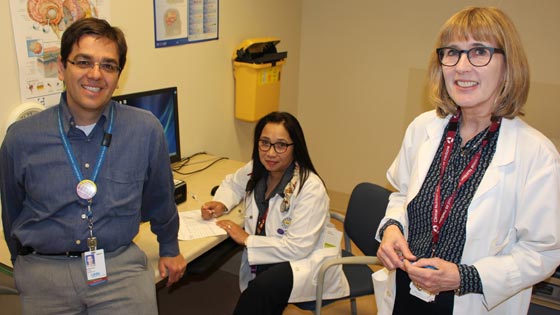
Dr. Eduard Bercovici shows off some of the food options available for patients at KNC’s adult epilepsy diet clinic. (Photo: UHN)
Dr. Eduard Bercovici shows off the goodies in his large cart with the sort of enthusiasm usually reserved for a door-to-door salesman.
But the UHN neurologist isn't hawking the latest household gadget or get-rich quick scheme, instead Dr. Bercovici's cart is stuffed with the sort of high-fat, low-carbohydrate food options he advises patients to consume at Canada's first adult epilepsy diet clinic.
"Some of these items here are pre-packaged, but for the most part in the clinic, we try to use everyday food whenever possible," says Dr. Bercovici. "In fact, what we ended up doing was scouring the supermarket looking for the types of foods that we think can help these patients."
The adult epilepsy diet clinic at the Krembil Neuroscience Centre (KNC) is designed to provide an alternate treatment path for those with difficult to control epilepsy.
The clinic uses a modified version of the Atkins diet that, along with medication and supplements, has the potential to help epilepsy patients reduce the frequency of their seizures.
"It's important for patients to understand that this is a medically supervised diet. This is not a fad diet," says Dr. Bercovici. "Just like any treatment there are side effects and that's why the diet needs to be supervised by a dietitian and a doctor."
Dr. Bercovici says the diet simulates fasting and forces the body to burn fats rather than carbohydrates. The diet is heavy on foods such as avocado, eggs, cheese and meats while steering clear of foods packed with carbohydrates, such as bread, rice, grains and fruit.

(L to R) Neurologist Dr. Eduard Bercovici, clinic nurse Chari Anor and registered dietitian Debra MacGarvie review food options for patients in KNC's adult epilepsy diet clinic. (Photo: UHN)
Five things patients can eat during barbecue and cottage season
UHN registered dietitian Debra MacGarvie says one goal of the adult epilepsy diet clinic goal is to give patients the guidance they need to make smart choices.
The diet is a medical treatment, so patients must be disciplined, but that doesn't mean it's devoid of tasty options.
As we enter barbecue and cottage season, MacGarvie offers five food options that patients in the program can indulge in over the summer.
Meat: "It's got fat on it, as long as it's not pre-packaged. If you cook it on the barbecue of grill it, then that's perfect."
Olive Oil: "Olive oil is recognized as one of the healthiest edible oils since it contains less saturated fats. Butter, margarine and corn oil can be used also however we do encourage the healthy oil."
Cheese: "It's a food that tastes great and fits into the diet because it is high in protein and good source of fat. Think of cottage cheese, cream cheese, cheddar cheese and mozzarella."
Eggs: "Boiled, fried, scrambled or in an omelet…eggs are a good source of protein, but we need to be cautious if cholesterol is high. We do encourage bacon with the eggs also.
Salad: "Lots of salad is encouraged. It's not just lettuce but all leafy greens. You might have a tomato that's chopped up, maybe some cucumber. And then we encourage putting a little grilled chicken, sliced steak or shrimp on top."
The clinic targets epilepsy patients deemed to be refractory, which means that medication on its own is not successful in controlling their seizures.
"Some patients do not respond to medication and some patients are not candidates for surgery. This treatment is an alternative for those patients who cannot be helped by traditional methods," says Dr. Danielle Andrade, Medical Director of the Epilepsy Program at KNC, who adds it takes a commitment on the part of the patient since the diet is not easy to follow.
"These patients, those that are sort of left behind, are the ones that we believe this diet has the best prospect of helping," adds Dr. Bercovici.
The new clinic at KNC is modelled on a similar facility at John Hopkins Hospital in Baltimore, which has successfully reduced the number of seizures for patients with refractory epilepsy.
"The statistics tell us that more than one third of patients will have 50 per cent fewer seizures than when they started," says Dr. Bercovici. "The numbers also tell us that between five and 10 per cent of those patients will end up being seizure free."
While similar epilepsy diet clinics exist for children at pediatric facilities, such as the Hospital for Sick Children and elsewhere, the Krembil clinic is a first in Canada designed specifically for adult patients.
"A lot of people are excited about it, especially those who have left the Sick Kids clinic, because they have no place to go," says Dr. Bercovici. "We are making an effort to get out into the community and let different groups know and educate them about the diet and that this clinic exists at UHN."
The clinic has not been open long enough to determine the degree to which the diet is helping patients, but Dr. Bercovici says early anecdotal feedback is encouraging.
In the meantime, he is trying to get the word out about the clinic's existence to patients, patient groups and doctors.
"So far we have seen some very positive signs," says Dr. Bercovici. "What we need now is awareness among patients and doctors in the epilepsy world."
